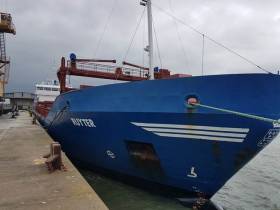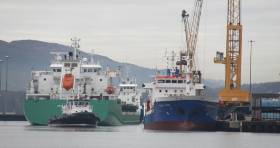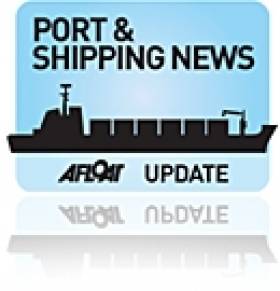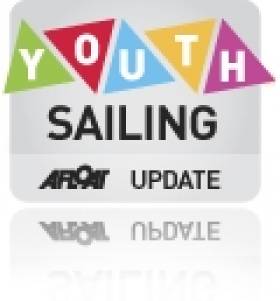Displaying items by tag: Warrenpoint
Captain Fined Over Negligence After Cargo Vessel Grounding
#Shipping - The captain of a cargo ship that ran aground on Rathlin Island last week has been fined £1,000 over his negligence at the helm, as the Belfast Telegraph reports.
The MV Ruyter, which was en route from Russia via Denmark and Scotland, sustained extensive damage to the front of its hull after running aground on the north side of Rathlin Island on the night of Tuesday 10 October.
However the damage was not noted till the vessel arrived at Warrenpoint in Carlingford Lough the following afternoon.
At a sitting of Armagh Court, Judge Paul Copeland found that Aleksandr Iakovotsov had broken international shipping codes over failure to keep a lookout to judge risk of collision, and a separate charge of failing to provide sufficient lookout “during the hours of darkness”.
The Belfast Telegraph has more on the story HERE.
Quinn Cement Facility in Warrenpoint to Support Export Growth Post-Brexit
#QuinnCement - Quinn Cement and Warrenpoint Harbour Authority have announced the opening of a new cement export hub at the Co. Down port.
The £2.5 million investment reflects a 10-year deal between the Cavan-based company and WHA. Final commissioning of the new facility was completed at the end of last month.
The export hub, which has an operational capacity of 7,500 tonnes will be dedicated to the export of bulk cement from the Quinn Cement operations in Ireland. The investment is a key pillar in Quinn Cement’s growth agenda for its GB operations and complements a £1.3 million upgrade to the Quinn Cement GB import facility in Rochester, Kent.
Commenting on the development Dara O’Reilly, CFO of Quinn Industrial Holdings said “This is an important and timely development for the business ahead of Brexit. It will allow Quinn Cement to strengthen our supply chain for bulk product, accommodate more flexible transport from our production facility in Co. Cavan and enhance the competiveness and sustainability of our operations on both islands. It also represents an endorsement of our working relationship with Warrenpoint Harbour Authority who have been extremely good to work with.
“Importantly, we believe this investment will help sustain and grow jobs at Quinn Cement and underpin economic activity on both sides of the border and in the south of England.”
Commenting on the development Warrenpoint Harbour Authority Chief Executive, Peter Conway said “The Port is delighted to consolidate the excellent trading relationship with Quinn Cement with the opening of the new export hub at the harbour. This investment and 10-year deal demonstrates the long term commitment of both parties to the successful business venture and is a major enhancement to the port’s trade."
"The Quinn Cement venture is a further demonstration of the Port working as an economic driver creating prosperity and jobs in the local economy and the Authority wishes Quinn every success in the future growth of its business.” added the Chief Executive.
18 Injured as Toxic Gas Leaks from Irish Cargoship
#SHIP TOXIC LEAK - Eighteen people are being treated after toxic gas used to kill rodents escaped from an Irish flagged dry-cargoship docked at Warrenpoint, Co Down.
The cargo on board Arklow Meadow had become wet and unstable. The gas is aluminium phosphide, a pesticide used to kill small mammals such as moles and rodents.
Gardaí have been informed of the potential of the chemical compound to drift into Co Louth. It is understood they are going house-to-house in the Omeath area advising householders to stay indoors and close all windows. For more on this story, RTE.ie reports.
Afloat.ie adds that the 2010 South Korean built vessel is owned by Arklow Shipping Ltd and is one of a five 'M' class series.These vessels each have a total grain capacity of 18,110m3 as previously reported, including the Arklow Manor which last month was dry-docked in Dublin Port.
Northern Ireland Yacht Club Awarded Volvo RYA Champion Club Status
Carlingford Lough Yacht Club in Northern Ireland has been presented with the prestigious Volvo RYA Champion Club award. Carlingford Lough has been recognised for its very active racing programme focusing on the Laser 4.7, Radial and Topper classes. The club encourages and supports talented young sailors to develop and progress throughout the RYA Youth and Olympic programmes.
The presentation was held at the Yacht club's annual dinner dance and presentation at local Whistledown Hotel, Warrenpoint. Commodore, Michael McCann understands the importance of developing the club's youth sailors "We are all very delighted and proud to have been awarded the coveted Volvo Champion Club status. This achievement is a reflection of the great work, dedication and energy which has been put into youth and junior sailing in recent years.
While a number of senior club members have been involved along the way I must single out our past sailing secretary Dr Henry McLaughlin who worked to fulfil the arduous requirements necessary to gain this recognition. The Club would also like to thank Volvo and the RYANI for this award and we will continue to work with them to promote Championship level sailing in the region."
The club's junior training programme is run by 8 regular volunteers who are committed and dedicated to helping with the racing, training and the club's busy social programme. For the past three years the club has had five juniors in the RYA Volvo national squad and at the 2010 RYA Volvo Zone Home County Championships in Northern Ireland two of the members excelled both finishing in second place.
Carlingford Lough Yacht club is one of only 12 clubs in Northern Ireland and 171 nationwide to be awarded the esteemed Volvo RYA Champion Club status. Richard Honeyford, RYA High Performance Manager for Northern Ireland presented the club with the award "I am delighted to be presenting this award in recognition of the great work that Carlingford Lough Yacht Club has done to help young sailors to develop their racing skills. Following the success of British sailors at the Beijing Olympics, and with the 2012 Olympics fast approaching, we may well be training future Olympians here in Carlingford Lough"
The Volvo RYA Champion Club Programme aims to encourage young sailors and windsurfers at grassroots level to stay in the sport and learn to compete, while encouraging clubs to introduce youngsters to the sport and help develop their skills. The key challenge for the programme is to encourage more young people to start participating in sailing and then progress with their racing careers.
Now Carlingford Lough Yacht club has been awarded the Volvo RYA Champion Club status, the sailors will see increased levels of development advice and professional coaching including support from the RYA. Carlingford Lough will also have access to the recent commitment from Sport England of £1.1m to the RYA's flagship youth sailing initiatives, to further enhance club coach and volunteer development across England over the next three years.



























































